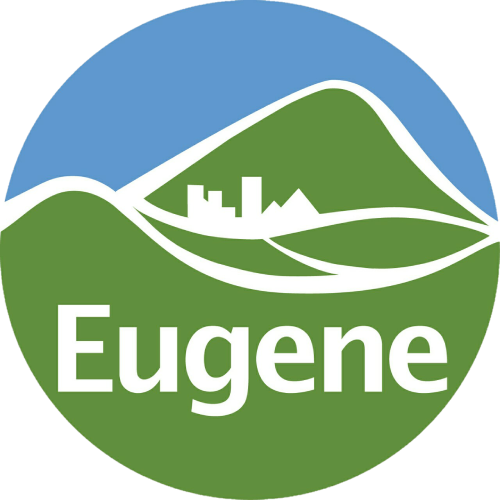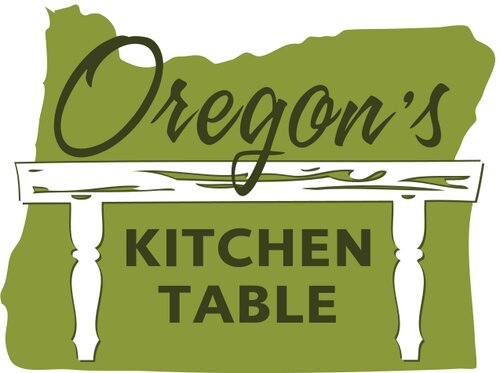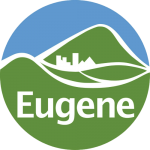Oregon’s first-ever lottery-selected Panel on a major planning project.

The 2020-21 Eugene Review Panel at work.
From November 2020 to April 2021, 29 everyday Eugene residents – selected through a democratic lottery – advised the City of Eugene on questions related to its Middle Housing Code Changes Project. Meeting online for a total of 35 hours over 15 meetings, the Panel drafted four reports, which not only provide advice on housing code revisions but also on the City’s public engagement practices.
Learn more about the process
Discussions on Democracy
A series of videos that takes a deep dive into different elements of the process.
Panelists’ Experiences
To help explain Panelists’ experiences to the public, members of the Panel’s Outreach Committee interviewed their fellow Panelists. These are some of their reflections.
Review Panel Reports
- The Review Panel met nine times in November and December 2020 to create Guiding Principles (Report 1).
- The Panel reconvened in February and April 2021 to review the City’s progress (Reports 2 & 4).
- As a first-of-its-kind public process in Eugene, the City also requested the Panel draft general recommendations for future public engagement (Report 3).
Report 1: Guiding Principles
Released after Nov. & Dec. 2020 sessions. This report includes a ranked list of Principles written by the Panel, to advise City staff on code changes related to HB2001.
Report 2: Review of Middle Housing Concepts
Released following the Panel’s Feb. 2021 sessions. This report includes feedback from the Panel related to several key code decisions. Panelists also voted on general approaches to each concept.
Report 3: Public Engagement Recommendations
Released following the Panel’s Feb. 2021 sessions. This report includes prioritized recommendations related to City public engagement, in general. It also includes results from a survey created by and for Panelists about their engagement experiences
Report 4: Review of Middle Housing Draft Code & Affordability Considerations
Released following the Panel’s April 2021 sessions. This report includes prioritized feedback on the City’s draft code language, as well as notes from the Panel on the subject of housing affordability
Key Dates
What: The Panel was randomly selected from among the responses we received, and the project was introduced to the public.
Review Panel: November–December 2020, February 2021 & April 2021
Where: Online and recorded
When:
Tuesdays & Thursdays, 6-8:30PM:
Nov. 10, 12, 17 & 24
Dec. 1 & 3Feb. 16, 18 & 23 (half-session on the 23rd)
April 20, 22 & 27 (half-session on the 27th)
Saturdays, 9:30AM–noon:
Nov. 14 & 21
Dec. 5
Daily Agendas
- Session 1 (Nov. 10) Agenda
- Session 2 (Nov. 12) Agenda
- Session 3 (Nov. 14) Agenda
- Session 4 (Nov. 17) Agenda
- Session 5 (Nov. 21) Agenda
- Session 6 (Nov. 24) Agenda
- Session 7 (Dec. 1) Agenda
- Session 8 (Dec. 3) Agenda
- Session 9 (Dec. 5) Agenda
- Session 10 (Feb. 16) Agenda
- Session 11 (Feb. 18) Agenda
- Session 12 (Feb. 23) Agenda
- Session 13 (Apr. 20) Agenda
- Session 14 (Apr. 22) Agenda
Presenters
Presenters Selected by the Steering Committee:
A first round of “background experts” on the subject at hand were selected by the project’s Steering Committee.
Session 1 (Nov. 10)
- Ethan Stuckmayer, Department of Land Conservation & Development, State of Oregon
- Alissa Hansen, Planning Director, City of Eugene
- Bio
- no slides used
Session 2 (Nov. 12)
- Rep. Julie Fahey, Oregon State House of Representatives
- Tyler Bump, ECONorthwest
- Bio
- no slides used
Session 3 (Nov. 14)
- Councilor Chris Pryor
- no slides used
- Renee Clough, Branch Engineering
- Dr. Sarah Adams-Schoen, University of Oregon
Presenters Selected by the Panel:
All further presenters were selected by the Panel itself. The Panel utilized (but was not limited to) a menu of potential stakeholders and experts compiled by the Steering Committee. (See Documents section below for details.)
Session 4 (Nov. 17)
Session 5 (Nov. 21)
- Danielle Arigoni, AARP
- Jon Belcher, River Road/Santa Clara Neighborhood Plan Community Advisory Committee
- Ethan Stuckmayer, Department of Land Conservation & Development, State of Oregon
Session 6 (Nov. 24)
- Josh McCarty, Urban3
- Ibrahim Coulibaly, Eugene Human Rights Commission & NAACP
- Bio
- no slides used
- Dan Bryant, SquareOne Villages
- Dylan Lamar, Cultivate, Inc.
- Matt McRae, Mayor’s Climate Recovery Ordinance Ad Hoc Work Group
Session 7 (Dec. 1)
- Noreen Dunnells, United Way and ALICE Report
- Laurie Hauber, Springfield Eugene Tenant Association
- Bio
- slides forthcoming
- Paul Conte, Neighborhood Advocate
Session 8 (Dec. 3)
Other Documents
- 2021 Mailed Materials
Below are several PDFs of materials that were mailed to the panelists in preparation for the 2021 sessions. - Demographic Profile of the Panel
An overview of:- the demographic targets for the Panel,
- the respondent pool,
- the initial selected Panelists (Nov. 1),
- the initial selected alternates (Nov. 1),
- the initial confirmed Panel (as of Nov. 6), and
- the final seated Panel.
- 2nd Round of Panel-Selected Presenters
The Panel’s second selection of presenters, completed at Session 4 (Nov. 17). - Menu of Potential Presenters & 1st Round of Panel-Selected Presenters
The menu of potential presenters prepared and prioritized by the Steering Committee, along with initial selections off the menu made by the Panel at Session 3 (Nov. 14). - City Briefing Documents
The following documents were provided by the City to the Panel as background information, before the start of the Panel’s work.- DOCUMENT 1 – Intro to Oregon’s Statewide Planning Program
- DOCUMENT 2 – Summary of Oregon’s Statewide Planning Goals
- DOCUMENT 3 – House Bill 2001 Background _ Requirements Fact Sheet
- DOCUMENT 4 – History of Middle Housing and Exclusion in Zoning Fact Sheet
- DOCUMENT 5 – Project Overview and Opportunities to Participate Fact Sheet
- DOCUMENT 6 – Market Factors Fact Sheet
- DOCUMENT 7 – Community Vision Map
- DOCUMENT 8 – Context Study Area Key Map
- DOCUMENT 9 – Planning 101 Presentation
- Rough Outline of the Process – An overview of the Review Panel process, as proposed by HD staff to the project’s Steering Committee on Oct. 22 and approved by that Committee on Nov. 5.
- Panelist Recruitment Letter – Mailed to 7,500 randomly selected residential addresses within Eugene’s Urban Growth Boundary.
- City of Eugene / Healthy Democracy Contract – In the interest of transparency, we’re publishing our contract with the City of Eugene here. See the addendums of this contract for more details on the project’s core principles and procedures. Note: in addition to the $50k budget outlined here, Healthy Democracy is contributing an additional $10k to the project.
- The invitation letter was sent to 7,500 Eugene residents!
Press and Presentations about the Project
- Dec. 14, 2020 — Update to the Eugene Planning Commission after the Fall 2020 portion of the Panel’s work (video) (slides) (full meeting agenda)
- Oct. 21, 2020 — Press Release Announcing the Eugene Review Panel
Process Partners
 Planning & Development Department City of Eugene, Oregon |  Oregon’s Kitchen Table, a project of the National Policy Consensus Center at Portland State University. |  |
Funders
Carol & Velma Saling Foundation
Additional Notes
Related to Live Streaming of the Panel
Periods when the Panel is in small groups are not live streamed or recorded, to ensure that Panelists feel comfortable having candid conversations with each other in those settings. This mirrors our in-room process, where observers sitting in the public gallery would similarly not be privy to discussions at small group tables.
We do recognize that oversight over moderators in these small groups is vital, however, which is why small groups are observed by independent Process Evaluators. The Panel’s own Process Oversight Committee also helps to provide oversight over staff conduct during small group sessions.
If the Panel moves into small groups while you’re watching the live stream, the live stream will cut out for that period. Unfortunately, our current software setup does not allow us to maintain a continuous live stream when the Panel goes into small groups. To reconnect after the full group has reconvened, go back to our main YouTube channel page, using the link on this page. Refer to the Daily Agendas for details on when the Panel will be in small groups.

